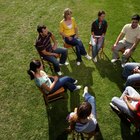
Sometimes, the most persistent, self-disciplined, adaptable and reliable students and professionals outperform those with higher cognitive abilities, according to James J. Heckman and Alan B. Krueger in their book Inequality in America. Non-cognitive skills include interpersonal skills, persistence, communication skills and other "soft" skills that are not objectively measured. Some individuals do not develop these skills early on in life. But fortunately, these skills can be learned.
Definition
Non-cognitive skills are any skills that are not cognitive, such as memory, attention, planning, language and thinking skills. Non-cognitive skills include emotional maturity, empathy, interpersonal skills and verbal and non-verbal communication. Non-cognitive skills influence the overall behavior of a person. For example, a nurse who is able to to easily comfort patients has non-cognitive skills.
Cognitive vs. Non-Cognitive
Non-cognitive skills are often not measurable, unlike cognitive skills, which educators can measure objectively with tests. As a result, educators can have a difficult time assessing non-cognitive skills and helping students develop these skills. Those who develop non-cognitive skills are more likely to develop cognitive skills, but not necessarily the other way around, according to Inequality in America.
Non-Cognitive Skills in the Workplace
Social skills are non-cognitive skills that play a major role in the workplace and are often demanded by employers. Effective non-cognitive skills tend to lead to higher wages and decreased incidents of risky behavior among individuals. Children who have developed non-cognitive skills are more adventuresome and open to learning, according to Judy Cameron of the Oregon National Primate Research Center.
Unlike specific skills that can only help workers in one type of workplace, such as the ability to fix cars, non-cognitive skills help workers in all workplaces. However, some workplaces value non-cognitive skills more than others. For example, non-cognitive skills are more important for salesmen than they are for assembly-line workers, according to the study "Non-Cognitive Skills, Social Success, and Labor Market Outcomes."
Developing Non-Cognitive Skills
Parents are more capable of helping children develop non-cognitive skills than anyone else. Efforts made by parents help children with their cognitive skills more in the earlier stages and with their non-cognitive skills in later stages in life. The child's non-cognitive skills change as the individual goes through her life. Non-cognitive skills are much easier to develop in adolescence than cognitive skills. Non-cognitive skills are partially innate and based off family intervention. However, non-cognitive skills can be developed both through deliberate learning and through practice or experience.
Inequality
Some of the non-cognitive skills highly valued by employers are interpersonal skills, negotiation skills and communication skills. Those with poor non-cognitive skills can become trapped. They do not receive the economic and workplace opportunities to develop their non-cognitive skills, so they become vulnerable to inequality in the workplace. However, workers can participate in social encounters and develop interpersonal skills.
Social Activities
Activities that can increase student participation in social events can help these students develop more non-cognitive skills. For example, high schools can offer athletics, student government, drama clubs and other extracurricular activities to give students more opportunities to develop non-cognitive skills.
Related Articles

How Absent Fathers Affect Men

What Are the Benefits of Self ...

Types of Extrinsic Motivation

What Effects Can Stress Have on a ...

How Does an Overbearing Mother Affect a ...

Importance of the Brother Sister Bond

How to Cope with Competitive People

What Is a Peer Facilitator?

The Disadvantages of Physical ...

What Is a Textile Motorcycle Jacket?

Facts About Orphans

What Are the Effects of High School ...

The Importance of Teenage Friendships

Difference Between Profit & Non Profit ...

Health Benefits of Organic Foods Vs. ...

A Brother's Influence on a Younger ...

Similarities and Differences Between ...

How Does Technology Affect Family ...

How Children Are Affected When Living ...

How Poor Relationships Affect the Family
References
Writer Bio
Chuck Robert specializes in nutrition, marketing, nonprofit organizations and travel. He has been writing since 2007, serving as a ghostwriter and contributing to online publications. Robert holds a Master of Arts with a dual specialization in literature and composition from Purdue University.
Photo Credits
Hemera Technologies/PhotoObjects.net/Getty Images